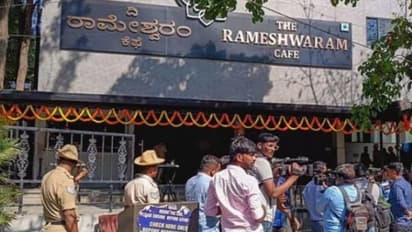BREAKING: NIA chargesheets four accused in Bengaluru Rameshwaram Cafe blast case; details here

Synopsis
The National Investigation Agency (NIA) on Monday filed chargesheets against four individuals in connection with the Rameshwaram Cafe blast case, which occurred in Bengaluru earlier this year.
The National Investigation Agency (NIA) on Monday filed chargesheets against four individuals in connection with the Rameshwaram Cafe blast case, which occurred in Bengaluru earlier this year. The blast, which took place on March 1, left nine people injured and caused extensive damage to the cafe located in Brookfield, ITPL.
The accused, identified as Mussavir Hussain Shazib, Abdul Matheen Ahmed Taaha, Maaz Muneer Ahmed, and Muzammil Shareef, have been charged under various sections of the Bharatiya Nyaya Sanhita (BNS), the Unlawful Activities (Prevention) Act (UAPA), the Explosive Substances Act, and the Prevention of Damage to Public Property (PDLP) Act. All four are currently in judicial custody following their arrests.
NIA investigations revealed that Shazib was the individual responsible for planting the Improvised Explosive Device (IED) that caused the explosion. Shazib and Taaha, who had been absconding since 2020 following the bust of the Al-Hind ISIS module, were arrested 42 days after the blast from a hideout in West Bengal. The two are said to have radicalized several youth, including their co-accused Ahmed and Shareef, to the ISIS ideology.
The blast at the cafe followed a failed IED attack on the BJP State Office in Malleshwaram, Bengaluru, on January 22, 2024. This attack was reportedly planned to coincide with the Pran Pratishtha ceremony in Ayodhya.
The NIA's investigation revealed that the accused used fraudulent Indian SIM cards, bank accounts, and fake identity documents sourced from the dark web. They were also found to have received funding via cryptocurrency, which was converted to fiat currency through Telegram-based peer-to-peer platforms.
Stay updated with the Breaking News Today and Latest News from across India and around the world. Get real-time updates, in-depth analysis, and comprehensive coverage of India News, World News, Indian Defence News, Kerala News, and Karnataka News. From politics to current affairs, follow every major story as it unfolds. Get real-time updates from IMD on major cities weather forecasts, including Rain alerts, Cyclone warnings, and temperature trends. Download the Asianet News Official App from the Android Play Store and iPhone App Store for accurate and timely news updates anytime, anywhere.